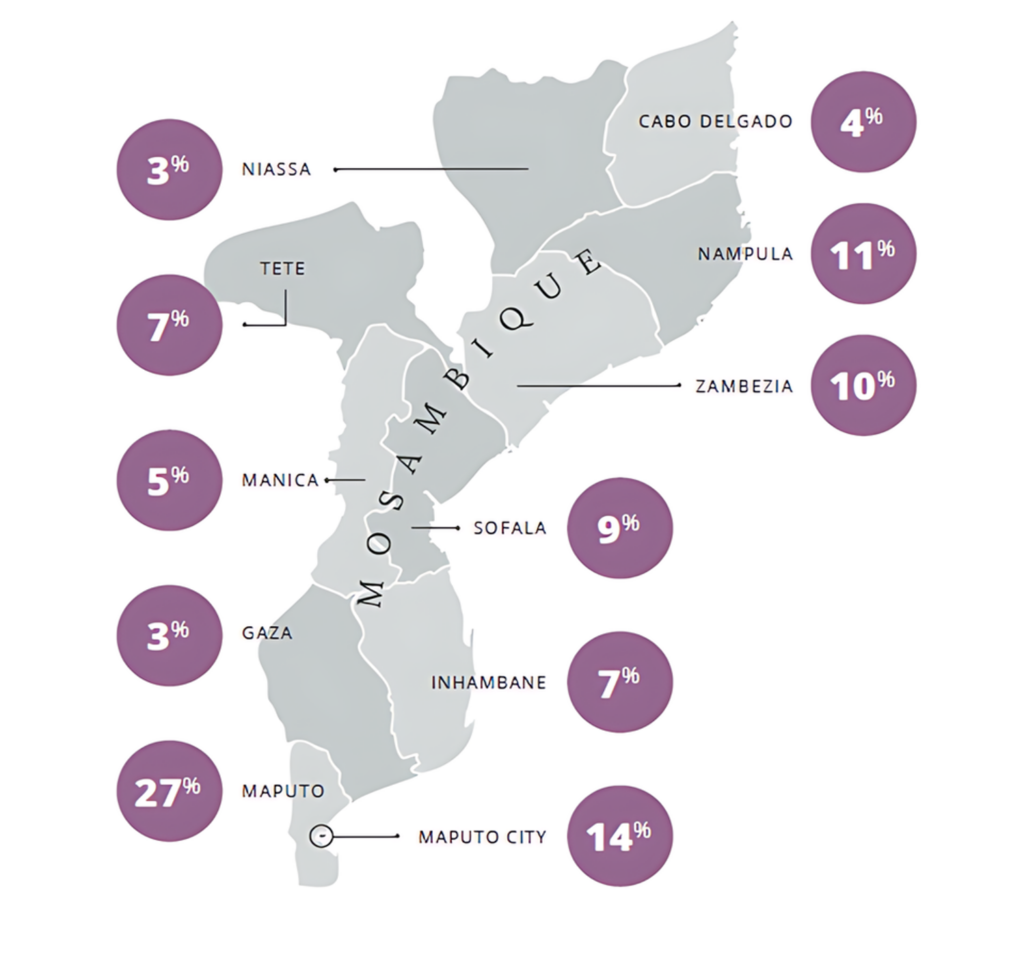- Contents
In March 2024, Project Last Mile partnered with GeoPoll to conduct a survey on smartphone, app, and social media usage in Mozambique. The objective of the study was to gain an understanding of the mobile and social media landscape in the country, including the interests, attitudes, and behaviors of smartphone users.
Survey Methodology
The study was conducted in Portuguese using GeoPoll’s Mobile Web research platform. Mobile Web is a link-based survey mode that can be taken on a very basic mobile phone browser.
For this survey, GeoPoll randomly sampled members from the extensive GeoPoll database of mobile subscribers in each province in Mozambique. This approach is called simple random sampling and accesses the overall database each day. The sampling strategy was intended to gather data from a range of age groups, gender, and locations within Mozambique.
To bolster the survey’s reach throughout Mozambique, GeoPoll also deployed online advertising channels, leveraging a methodology tailored to the specific demographics and profiles of the intended respondents.
In total, 750 respondents participated in the survey. All 11 provinces in Mozambique were represented, with the largest segments from Maputo and Maputo City.

The distribution by gender was 77% male, 22% female, and 2% that specified “other.” Most respondents fell within the 25-34 age range at 61%, followed by the
16-24 age range at 23%, and the 35+ age range at 17%.
All 750 respondents included in the survey were required to own or otherwise have access to a smartphone.
Survey Findings
Key takeaways from the research include:
- Although 95% of respondents in this study personally own a smartphone and the remaining 5% have access to a smartphone owned by a spouse, family member, friend, etc., only 69% of respondents consider themselves the primary user of the smartphone (suggesting a significant number of shared devices).
- Slightly more men consider themselves the primary user (71%) compared to women (64%).
- Women are more likely than men to have just started using a smartphone within the past year (10% vs. 5%).
- Social media and messaging are by far the most widely installed and used smartphone apps across gender and age groups.
- Almost all respondents use Facebook (93%), and most use WhatsApp (81%) and SMS/text messaging (79%).
- Most smartphone users regardless of gender or age rely on mobile data as their primary means for accessing the internet (93%) and access the internet multiple times a day (88%).
- Most access social media multiple times a day (87%), primarily using their smartphone (79%), and spend at least 30 minutes each time they access it (72%).
- Data costs pose the biggest challenge to using social media and apps (69%), followed by internet connectivity (37%), and privacy concerns (31%).
- Perceptions of social media’s impact on local culture and society skew positive overall. A third of respondents believe the impact is very positive (32%), ranging from 39% for respondents ages 35+ to 24% for respondents ages 16-24.
- Most respondents across gender and age groups are using health-related apps or chats on their smartphone (84%), and almost all express at least some level of trust in the apps/chats they use.
- When asked which types of apps they would prioritize if they had limited time, money, or access to their phone, by far the largest segment of respondents said health apps (48%), rising to 52% for women.
Click here to download GeoPoll’s full written report on smartphone and social media usage in Mozambique.
About GeoPoll
GeoPoll provides full-service research solutions in more than 120 countries globally, focusing on low- and middle-income countries. Every year, GeoPoll completes over 5 million surveys via multiple mobile-based remote and in-person data collection modes, powered by a network of 10,000+ interviewers from 65 call centers, local teams, and direct partnerships with mobile network operators. Contact us to learn more about this study and our capabilities.
About Project Last Mile
If you can find an ice-cold Coca-Cola product almost anywhere in Africa, why not life-saving medicines? Project Last Mile is a global cross-sector partnership between donors, ministries of health, and the private sector that translates supply chain and marketing best practices from the Coca-Cola ecosystem into customized solutions for public health challenges. We focus on route-to- market, cold chain strengthening, and strategic marketing and communications. We aim to improve access, availability, and demand for life-saving medicines and health services down to the last mile in Africa. Since the first pilot in 2009, Project Last Mile has transformed into a leading public-private partnership for health. We have undertaken over 59 projects across 17 African countries, impacting the lives of more than 43 million people.
Find out more at www.projectlastmile.com.

